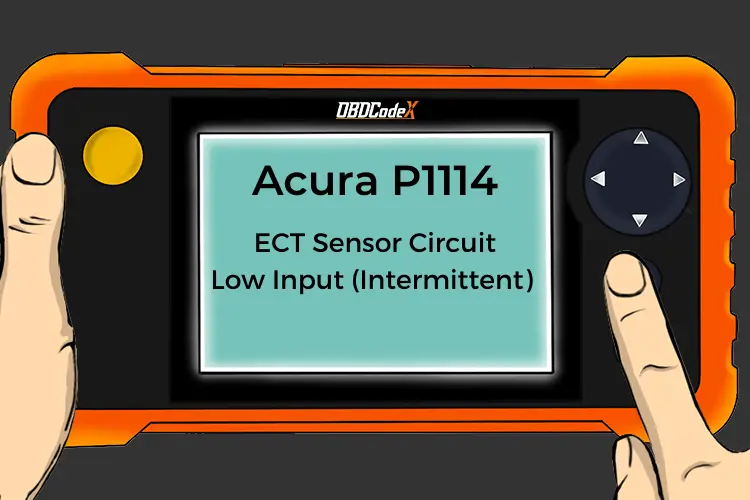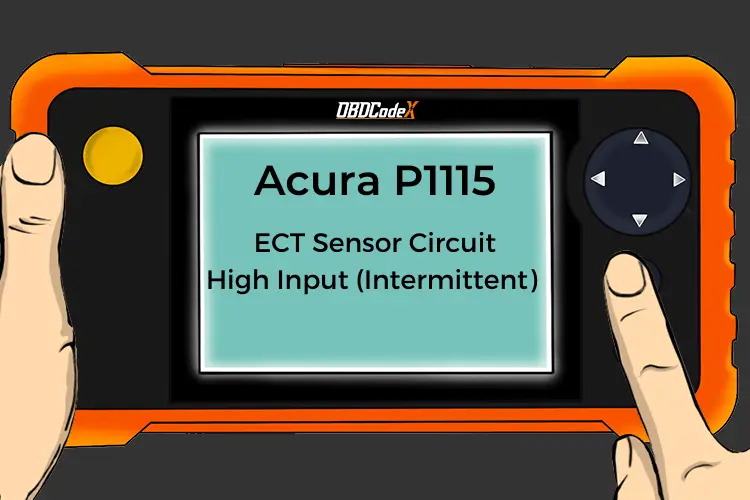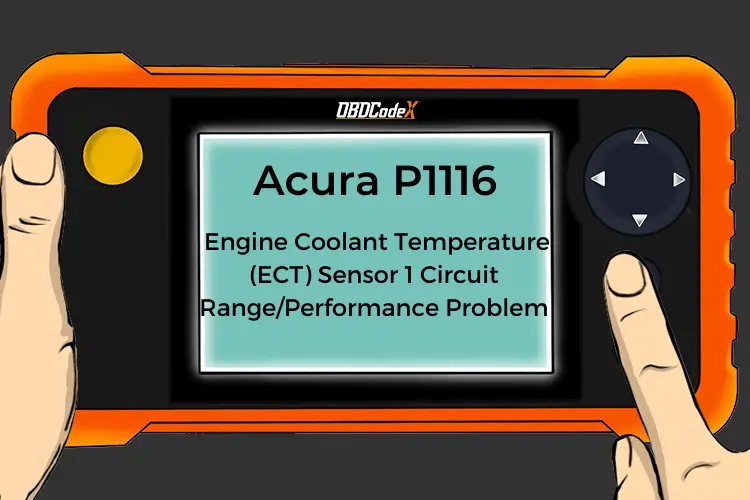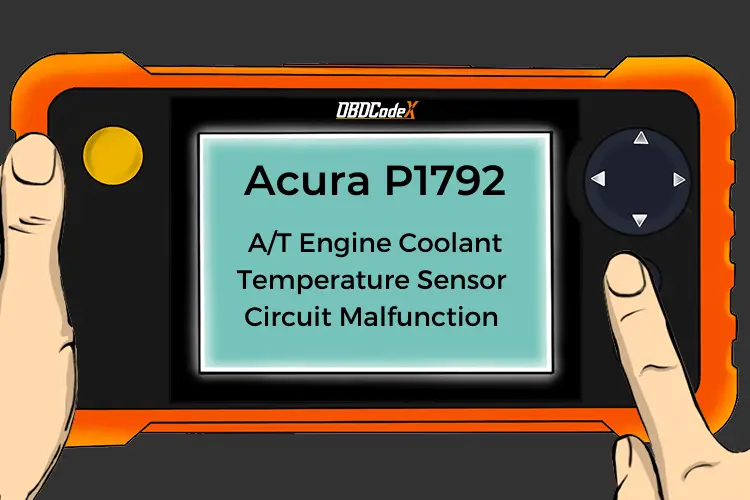P00B2: Radiator Coolant Temperature Sensor Circuit Range/Performance
Is your scanner showing P00B2?
No worries. We'll show you what it means and how to deal with it.
P00B2: Radiator Coolant Temperature Sensor Circuit Range/Performance
OVERVIEWWhat Does The P00B2 Code Mean?
The cooling system is an integral part of your vehicles engine system. It is responsible for not only monitoring your engine’s temperature but also regulating it. It does this using various electrical and mechanical systems/components including but not limited to: Coolant Temperature Sensor (CTS), radiator, water pump, thermostat, etc.
The Engine Control Module (ECM) uses the CTS’ values to monitor the engine’s temperature and in turn, can regulate it accurately. Different temperatures require different air/fuel mixtures so it is imperative that the CTS is functioning within desired ranges. Most times, CTS’ are Negative Temperature Coefficient sensors, which means, the resistance within the sensor itself decreases as the temperature rises. Understanding this will help you greatly when troubleshooting.
The ECM activates P00B1 and associated codes when it monitors one or multiples condition outside a specific electrical range within the CTS or it’s circuit.
The ECM may detect an issue that is not consistent which comes and goes (P00B5) From my experience, the culprit here tends to be mechanical. Keep in mind, electrical faults could be the cause as well.
P00B2 Radiator Coolant Temperature Sensor Circuit Range/Performance code is set when the ECM recognizes a performance issue (i.e sensor operating outside of it’s desired range). It is one of five related codes, which are P00B1, P00B2, P00B3, P00B4, and P00B5.
What Are The Symptoms Of The P00B2 Code?
Symptoms of a P00B2 diagnostic code may include:
- Hard cold starts
- Erratic idle
- Engine stalling
- Poor fuel mileage
- Smoking exhaust
- Fuel smell Symptoms
- Erratic or false temperature readings
- Poor engine performance
What Are The Potential Causes Of The P00B2 Code?
Causes for this code may include:
- Defective radiator or other coolant temperature sensor (CTS)
- Dirty/plugged sensor pickup
- Sensor O-ring/Gasket leaking
- Broken or damaged wiring harness
- Fuse
- ECM issue
- Pin/connector problem (corrosion, melting, broken lock tab etc.)
How Serious Is This P00B2 Code?
This code would be considered a moderately severe issue. This will vary on what symptoms you have and how the fault is actually affecting your vehicles performance. The fact that the CTS’s functionality directly influences the engine’s air/fuel mixture, makes this an issue you do not want to leave unattended. Neglect this problem long enough, and you could be faced with some hefty engine repair bills.
How Can You Fix The P00B2 Code?
Be sure to check for technical service bulletins (TSBs) for your vehicle. Getting access to a known fix can save you time and money during diagnosis.
Tools
Some of the things you may need when diagnosing or repairing the radiator coolant temperature sensor circuits and systems:
- OBD code reader
- Antifreeze/Coolant
- Drain pan
- Multimeter
- Basic socket set
- Basic ratchet and wrench sets
- Basic screwdriver set
- Battery terminal cleaner
- Service manual
Safety Tips
- Let engine cool
- Chalk wheels
- Wear PPE (Personal protective equipment)
NOTE: ALWAYS verify and record the integrity of your battery and charging system before further troubleshooting.
Basic Step #1
First thing I would do if this code is set, would be to inspect the radiator coolant temperature sensor itself for any obvious signs of damage. Generally speaking, these sensors are mounted in the radiator or somewhere along the coolant’s line/hoses but I have also seen them mounted to the cylinder head itself among other obscure locations so, refer to your service manual for the exact location.
NOTE: Whenever diagnosing/repairing anything involving the cooling system, make sure to let engine cool completely before proceeding.
Basic Step #2
Test the sensor. Given the fact that the internal resistance within the sensor changes in relation to the temperature, you will need a specific desired resistance/temperature (refer to manual). Once you have your specification, using your multimeter, test the resistance between the pins of the radiator CTS. Anything out of desired range indicates a defective sensor. Replace as necessary.
NOTE: Over time and exposure to the elements, these sensors’ plastic can become very brittle. Be mindful not to damage the connectors when diagnosing/repairing.
Basic Tip #3
Check for leaks. Verify that the sensor is not leaking around its seal. A leak here may cause erratic readings as air is being introduced into the system. For the most part, these gaskets/ seals are extremely easy to replace and inexpensive. Regardless of if this is in fact the root cause of your problem or not, it needs to be addressed before continuing.
NOTE: Refer to your service manual to know what specific antifreeze/coolant is to be used. Using the incorrect antifreeze can cause internal corrosion so make sure to buy the right stuff!
Basic Step #4
Given the location of the sensor, pay special attention on where the CTS’ harness is routed. These sensors and corresponding harness’ are subject to extreme heats and not to mention the elements. Melting harness’ and wires are common issues for these faults so repair any damaged wiring.
Basic Step #5
Clean the CTS. It may be simple to remove the sensor completely from the vehicle. If so, you may want to remove the sensor and inspect for any debris/residue that may affect the sensor’s ability of receiving the correct readings.
Recommended Parts
Below are some recommended auto parts to help you address the trouble code affecting your vehicle and get it running smoothly again:
>>> CrocSee 250 Pieces - Car Fuses Assortment Kit
>>> WORKPRO 582-piece Crimp Terminals, Wire Connectors, Heat Shrink Tube, Electrical Repair Kit
>>> Dorman 86689C 399 PC Automotive Electrical Repair Kit
>>> ECU
>>> INNOVA 5210
>>> Valvoline Multi-Vehicle Ready-to-Use Antifreeze
>>> Amazon Basics Flexible Ratcheting Wrench Set
>>> Amartisan 10-Piece Magnetic Screwdrivers Set
>>> NOCO E404 12.25 Oz Battery Terminal Cleaner
Note: During the purchasing process, please check carefully whether the part you want to buy fits your car!
Reference Sources
P00B2: Radiator Coolant Temp Sensor Circuit Range, OBD-Codes.




